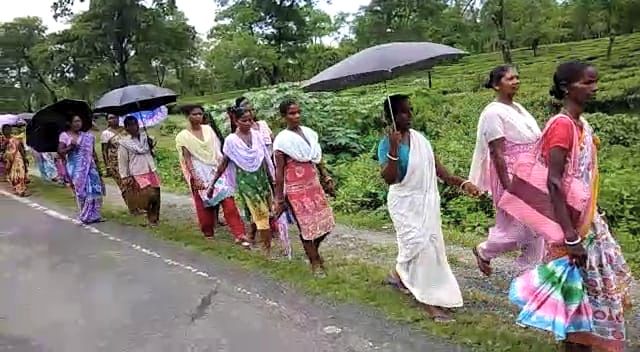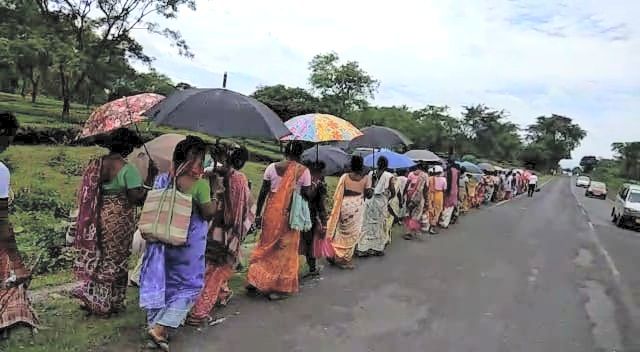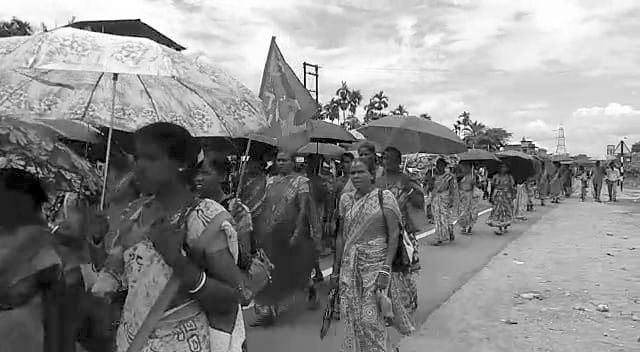Tea Workers in WB on Strike Demanding Minimum Wage

Workers in tea gardens of both West Bengal and Assam are a famished lot. After Indian Railways, Tea is among the biggest industries in terms of providing employment in the land where millions of workers are regularly deprived even of subsistence wages and suffer from starvation deaths, not restricted only to abandoned or locked out tea gardens.
To counter the myth of non-realization of profits by the employers and their perpetual backlash against workers’ demand even for the realization of a Minimum Wage, 29 trade unions operating in tea sector of West Bengal joined hands to create a ‘Joint Forum’ way back in 2014 through a workers’ convention at Chalsa in Dooars region of the tea belt in North Bengal. In the wake of a vibrant workers’ solidarity movement, the Mamata Banerjee led TMC govt. assured the unions to implement minimum wages for the first time in the history of more than 150 years tea industry in Bengal and a tripartite agreement was signed to that end on 20 February 2015. Similar demand for wages has also been raised continuously in Assam’s tea gardens.
All through the last three and half years, Joint Forum could achieve a degree of acceptance among 4.5 lakh tea workers of Bengal as it treaded the path of united mass movements. But the demands for Minimum Wages, realization of the monetized value of their legitimate rations as provided earlier as part of wage, a tract of homestead land for permanent workers, opening of closed estates and enhancing the retirement age of permanent workers from the present 58 years to 60 years etc. remained a chimera due to behind the curtain deals between the state govt. and the employers.

The labour directorate of the state ultimately placed an amount of Rs. 172 as being the proposed Minimum Wage, notwithstanding the very basics of Minimum Wage calculations. They completely fumbled and ignored to consider the base index of Industrial workers, the considered quantity of balanced food basket, the monetized value of fuel and electricity as 20% weightage and 25% more to add as cost price of education, health, old age provisions etc. to keep afloat the employers’ excessive profit ratio. The constituent unions of Joint Forum placed before the labour secretary their considered calculation to continue the negotiations. But he unilaterally called it quits, leaving aside the tripartite parley in scramble. To fight back the sabotage by the employers and to compel the labour directorate to announce an acceptable structure of Minimum Wage, the Joint Forum (Tarai Sangrami Cha Shramik Union, affiliated to AICCTU being one of the constituents) gave a call for 3-days strike in the tea sectors of Bengal on 7-8-9 August 2018 and asked the workers of every tea gardens both from the hills and the plains to take to the streets to start a long march to reach chief minister Mamata’s Mini-Secretariat ‘Uttorkanya’ at Siliguri.
Such massive and unprecedented workers’ march was barricaded and stopped with much trouble by the police administration at 48 different points and intimidations ensued to stall the strike mid-way. Undaunted the strikers went ahead with the scheduled timeframe of the movemental activities. Dispatch of finished tea consignments was blocked by workers in the gardens. The labour minister of the state convened an emergency meeting, but only with the employers and few leaders from ruling party unions on 16 August which was, as expected, proved useless. The Joint Forum now planning to escalate the movement in the last week of August if the state govt. fails to finalise a revised Minimum Wage structure for the struggling tea workers of Bengal.

Charu Bhawan, U-90, Shakarpur, Delhi 110092
Phone: +91-11-42785864 | +91 9717274961 E-mail: info@cpiml.org

